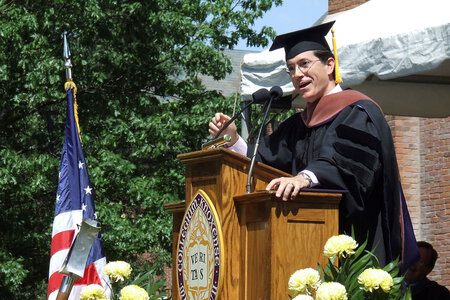American comedian Stephen Colbert delivered the commencement address to the graduating seniors at Knox College.
Stephen Colbert’s 2006 Commencement Speech Transcript
Thank you. Thank you very much. First of all, I’m facing a little bit of a conundrum here. My name is Stephen Colbert, but I actually play someone on television named Stephen Colbert, who looks like me, and who talks like me, but who says things with a straight face he doesn’t mean. And I’m not sure which one of us you invited to speak here today. So, with your indulgence, I’m just going to talk and I’m going to let you figure it out.
I wanted to say something about the Umberto Eco quote that was used earlier from The Name of the Rose. That book fascinated me because in it these people are killed for trying to get out of this library a book about comedy, Aristotle’s Commentary on Comedy. And what’s interesting to me is one of the arguments they have in the book is that comedy is bad because nowhere in the New Testament does it say that Jesus laughed. It says Jesus wept, but never did he laugh.
But, I don’t think you actually have to say it for us to imagine Jesus laughing. In the famous episode where there’s a storm on the lake, and the fishermen are out there. And they see Jesus on the shore, and Jesus walks across the stormy waters to the boat. And St. Peter thinks, “I can do this. I can do this. He keeps telling us to have faith and we can do anything. I can do this.” So he steps out of the boat and he walks for—I don’t know, it doesn’t say—a few feet, without sinking into the waves. But then he looks down, and he sees how stormy the seas are. He loses his faith and he begins to sink. And Jesus hot-foots it over and pulls him from the waves and says, “Oh you of little faith.” I can’t imagine Jesus wasn’t suppressing a laugh. How hilarious must it have been to watch Peter—like Wile E. Coyote—take three steps on the water and then sink into the waves.
Well it’s an honor to be giving your Commencement address here today at Knox College. I want to thank Mr. Podesta for asking me two, two and a half years ago, was it? Something like that? We were in Aspen. You know—being people who go to Aspen. He asked me if I would give a speech at Knox College, and I think it was the altitude, but I said yes. I’m very glad that I did.
On a beautiful day like this I’m reminded of my own graduation 20 years ago, at Northwestern University. I didn’t start there, I finished there. On the graduation day, a beautiful day like this. We’re all in our gowns. I go up on the podium to get my leather folder with my diploma in it. And as I get it from the Dean, she leans in close to me and she smiles, and she says—[train whistle] that’s my ride, actually. I have got to get on that train, I’m sorry. [Heads off stage.] Evidently that happens a lot here.—So, I’m getting my folder, and the Dean leans into me, shakes my hand and says, “I’m sorry.” I have no idea what she means. So I go back to my seat and I open it up. And, instead of having a diploma inside, there’s a scrap—a torn scrap of paper—that has scrawled on it, “See me.” I kid you not.
Evidently I had an incomplete in an independent study that I had failed to complete. And I did not have enough credits. And, let me tell you, when your whole family shows up and you get to have your picture taken with them—and instead of holding up your diploma, you hold the torn corner of a yellow legal pad—that is a humbling experience. But eventually, I finished. I got my credits and next year at Christmas time, they have mid-year graduation. And I went there to get my diploma then. They said that I had an overdue library fine and they wouldn’t give it to me again. And they eventually mailed it to me…I think. I’m pretty sure I graduated from college.
But I guess the question is, why have a two-time commencement loser like me speak to you today? Well, one of the reasons they already mentioned—I recovered from that slow start. And I was recently named by Time magazine one of the 100 Most Influential People in the World! Yeah! Give it up for me! Basic cable—THE WORLD! I guess I have more fans in Sub-Saharan Africa than I thought. I’m right here on the cover between Katie Couric and Bono. That’s my little picture—a sexy little sandwich between those two.
But if you do the math, there are 100 Most Influential People in the World. There are 6.5 billion people in the world. That means that today I am here representing 65 million people. That’s as big as some countries. What country has about 65 million people? Iran? Iran has 65 million people. So, for all intents and purposes, I’m here representing Iran today. Don’t shoot.
But the best reason for me to come to speak at Knox College is that I attended Knox College. This is part of my personal history that you will rarely see reported. Partly because the press doesn’t do the proper research. But mostly because—it is not true! I just made it up, so this moment would be more poignant for all of us. How great would it be if I could actually come back here—if I was coming back to my alma mater to be honored like this. I could share with you all my happy memories that I spent here in…Galesburg, Illinois. Hanging out at the Seymour Hall, right? Seymour Hall? You know, all of us alumni, we remember being at Seymour Hall, playing those drinking games. We played a drinking game called Lincoln-Douglas. Great game. What you do is, you act out the Lincoln-Douglas debate and any time one of the guys mentions the Dred Scott decision you have to chug a beer. Well, technically 3/5 of a beer. [groans from audience]
You DO have a good education! I wasn’t sure if anybody was going to get that joke.
I soon learned that a frat house—oops—divided against itself cannot stand.
How can I forget cheering on the team—the Knox College Knockers? The Prairie Fire. Seriously, the Prairie Fire. Your team is named after something that can get you federal disaster relief. I assume the “Flash Floods” was taken.
Oh, yes, the memories are so fresh. It was as if it was just yesterday I made them up. And the history, you don’t have to tell me the history of Knox College. No, your Web site is very thorough. The college itself has long been known for its diversity. I am myself a supporter of diversity. I myself have an interracial marriage. I am Irish and my wife is Scottish. But we work it out. And it is fitting, most fitting, that I should speak at Knox College today because it was founded by abolitionists. And I gotta say—I’m going to go out on the limb here—I believe slavery was wrong. No, I don’t care who that upsets. I just hope the mainstream media give me the credit for the courage it took to say that today. I know the blogosphere is just going to explode tomorrow. But enough about me—if there can be enough about me.
Today is about you—you who have worked so hard to pack your heads with learning until your skulls are all plump like—sausage of knowledge. It’s an apt metaphor, don’t question it. But now your time at college is at an end. Now you are leaving here. And this leads me to a question that just isn’t asked enough at commencements. Why are you leaving here?
This seems like a very nice place. They have a lovely Web site. Besides, have you seen the world outside lately? They are playing for KEEPS out there, folks. My God, I couldn’t wait to get here today just so I could take a breather from the real world. I don’t know if they told you what’s happened while you’ve matriculated here for the past four years. The world is waiting for you people with a club. Unprecedented changes happening in the last four years. Like globalization. We now live in a hyperconnected, global economic, outsourced society. Now there are positives and minuses here. And a positive is that globalization helps us understand and learn from otherwise foreign cultures. For example, I now know how to ask for a Happy Meal in five different languages. In Paris, I’d like a “Repas Heureux” In Madrid a “Comida Feliz” In Calcutta, a “Kushkana, hold the beef.” In Tokyo, a “Happi- Shokuji ” And in Berlin, I can order what is perhaps the least happy-sounding Happy Meal, a “Glückselig Mahlzeit.”
Also globalization, e-mail, cell phones interconnect our nations like never before. It is possible for even the most insulated American to have friends from all over the world. For instance, I recently received an e-mail asking me to help a deposed Nigerian prince who is looking for a business partner to recuperate his fortune. Thanks to the flexibility of global banking, a Swiss bank account is ready and waiting for my share of his money. I know, because I just e-mailed him my Social Security number.
Unfortunately for you job seekers, corporations searching for a better bottom line have moved many of their operations overseas, whether it’s a customer service operator, a power factory foreman, or an American flag manufacturer. They’re just as likely to be found in Shanghai as Omaha. In fact, outsourcing is so easy that I had this speech today written by a young man named Panjeeb from Bangalore.
If you don’t like the jokes, I assure you they were much funnier in Urdu…
And when you enter the workforce, you will find competition from those crossing our all-too-porous borders. Now I know you’re all going to say, “Stephen, Stephen, immigrants built America.” Yes, but here’s the thing—it’s built now. I think it was finished in the mid-70s sometime. At this point it’s a touch-up and repair job. But thankfully Congress is acting and soon English will be the official language of America. Because if we surrender the national anthem to Spanish, the next thing you know, they’ll be translating the Bible. God wrote it in English for a reason! So it could be taught in our public schools.
So we must build walls. A wall obviously across the entire southern border. That’s the answer. That may not be enough—maybe a moat in front of it, or a fire-pit. Maybe a flaming moat, filled with fire-proof crocodiles. And we should probably wall off the northern border as well. Keep those Canadians with their socialized medicine and their skunky beer out. And because immigrants can swim, we’ll probably want to wall off the coasts as well. And while we’re at it, we need to put up a dome, in case they have catapults. And we’ll punch some holes in it so we can breathe. Breathe free. It’s time for illegal immigrants to go—right after they finish building those walls. Yes, yes, I agree with me.
There are so many challenges facing this next generation, and as they said earlier, you are up for these challenges. And I agree, except that I don’t think you are. I don’t know if you’re tough enough to handle this. You are the most cuddled generation in history. I belong to the last generation that did not have to be in a car seat. You had to be in car seats. I did not have to wear a helmet when I rode my bike. You do. You have to wear helmets when you go swimming, right? In case you bump your head against the side of the pool. Oh, by the way, I should have said, my speech today may contain some peanut products.
My mother had 11 children: Jimmy, Eddie, Mary, Billy, Morgan, Tommy, Jay, Lou, Paul, Peter, Stephen. You may applaud my mother’s womb. Thank you, I’ll let her know. She could never protect us the way you all have been protected. She couldn’t fit 11 car seats. She would just open the back of her Town & Country—stack us like cord wood: four this way, four that way. And she put crushed glass in the empty spaces to keep it steady. Then she would roll up all the windows in the winter time and light up a cigarette. When I die I will not need to be embalmed, because as a child my mother hickory-smoked me.
I mean even these ceremonies are too safe. I mean this mortarboard…look, it’s padded. It’s padded everywhere. When I graduated from college, we had the edges sharpened. When we threw ours up in the air, we knew some of us weren’t coming home.
But you have one thing that may save you, and that is your youth. This is your great strength. It is also why I hate and fear you. Hear me out. It has been said that children are our future. But does that not also mean that we are their past? You are here to replace us. I don’t understand why we’re here helping and honoring them. You do not see union workers holding benefits for robots.
But you seem nice enough, so I’ll try to give you some advice. First of all, when you go to apply for your first job, don’t wear these robes. Medieval garb does not instill confidence in future employers—unless you’re applying to be a scrivener. And if someone does offer you a job, say yes. You can always quit later. Then at least you’ll be one of the unemployed as opposed to one of the never-employed. Nothing looks worse on a resume than nothing.
So, say “yes.” In fact, say “yes” as often as you can. When I was starting out in Chicago, doing improvisational theatre with Second City and other places, there was really only one rule I was taught about improv. That was, “yes-and.” In this case, “yes-and” is a verb. To “yes-and.” I yes-and, you yes-and, he, she or it yes-ands. And yes-anding means that when you go onstage to improvise a scene with no script, you have no idea what’s going to happen, maybe with someone you’ve never met before. To build a scene, you have to accept. To build anything onstage, you have to accept what the other improviser initiates on stage. They say you’re doctors—you’re doctors. And then, you add to that: We’re doctors and we’re trapped in an ice cave. That’s the “-and.” And then hopefully they “yes-and” you back. You have to keep your eyes open when you do this. You have to be aware of what the other performer is offering you, so that you can agree and add to it. And through these agreements, you can improvise a scene or a one-act play. And because, by following each other’s lead, neither of you are really in control. It’s more of a mutual discovery than a solo adventure. What happens in a scene is often as much a surprise to you as it is to the audience.
Well, you are about to start the greatest improvisation of all. With no script. No idea what’s going to happen, often with people and places you have never seen before. And you are not in control.
Well, you are about to start the greatest improvisation of all. With no script. No idea what’s going to happen, often with people and places you have never seen before. And you are not in control. So say “yes.” And if you’re lucky, you’ll find people who will say “yes” back.
Now will saying “yes” get you in trouble at times? Will saying “yes” lead you to doing some foolish things? Yes it will. But don’t be afraid to be a fool. Remember, you cannot be both young and wise. Young people who pretend to be wise to the ways of the world are mostly just cynics. Cynicism masquerades as wisdom, but it is the farthest thing from it. Because cynics don’t learn anything. Because cynicism is a self-imposed blindness, a rejection of the world because we are afraid it will hurt us or disappoint us. Cynics always say no. But saying “yes” begins things. Saying “yes” is how things grow. Saying “yes” leads to knowledge. “Yes” is for young people. So for as long as you have the strength to, say “yes.”
And that’s The Word.
I have two last pieces of advice. First, being pre-approved for a credit card does not mean you have to apply for it. And lastly, the best career advice I can give you is to get your own TV show. It pays well, the hours are good, and you are famous. And eventually some very nice people will give you a doctorate in fine arts for doing jack squat.
Congratulations to the class of 2006. Thank you for the honor of addressing you.



Comments are closed.